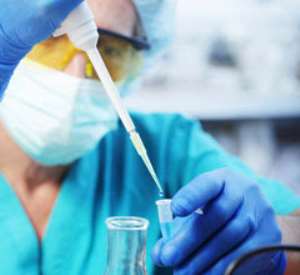
HLA testing and organ transplant
Major Histocompatibility Complex
Embedded in the membrane of every human cell is an array of molecules many of them glycoprotein that are recognized by the immune system of another human as antigens.
Normally, the body's immune system does not respond to its own membrane antigens because they are self. Transplanted foreign cells, however, carry nonself membrane antigens that can be recognized, and following the recognition, the cells carrying those antigens can be destroyed.
Thus, for a successful transplant, there must be minimal differences between the antigens of the recipient and the donor, ie, the individuals must be histocompatible. Ultimately, of course, the search for compatibility requires an understanding of genetic control of histocompatibility antigens.
A small segment of the chromosome is referred to as the major histocompatibility complex (MHC) and encodes within it the strongest histocompatibility or transplantation antigens. This complex of deoxyribonucleic acid (DNA) comprises approximately 1/1000 of all genetic material.
These are the antigens that if recognized as foreign in cells of an allograft, lead to rapid destruction of that allograft. Various aspects of the major histocompatibility complex in humans referred to as HLA. Besides these very strong transplantation antigens, a number of other immunologically related phenomena are controlled by or at least influenced by genes located in the MCH, eg, immune responsiveness (Ir), susceptibility to some diseases various components of the complement system and cell-mediated responses against virally infected autologous or syngeneic cells.
The evidence for immune responsiveness genes in humans is still fragmentary, although the MHC includes Ir genes in several other species, for example, mouse, guinea pigs, rat, and rhesus monkey.
This article discusses the detection of histocompatibility antigens in humans and how they are controlled by MHC genes. Grafts may be rejected if incompatibility loci that are not encoded by the MHC referred to as minor histocompatibility loci.




 Supreme court declares payment of wages to spouses of President, Vice President ...
Supreme court declares payment of wages to spouses of President, Vice President ...
 Publish full KPMG report on SML-GRA contract – Bright Simons to Akufo-Addo
Publish full KPMG report on SML-GRA contract – Bright Simons to Akufo-Addo
 Kumasi International Airport to begin full operations by end of June
Kumasi International Airport to begin full operations by end of June
 Election 2024: Our ‘real challenge’ is getting ‘un-bothered’ youth to vote – Abu...
Election 2024: Our ‘real challenge’ is getting ‘un-bothered’ youth to vote – Abu...
 [Full text] Findings and recommendations by KPMG on SML-GRA contract
[Full text] Findings and recommendations by KPMG on SML-GRA contract
 Renegotiate SML contract – Akufo-Addo to GRA, Finance Ministry
Renegotiate SML contract – Akufo-Addo to GRA, Finance Ministry
 J.B Danquah-Adu murder trial: Sexy Dondon to Subpoena Ken Agyapong, Ursula Owusu
J.B Danquah-Adu murder trial: Sexy Dondon to Subpoena Ken Agyapong, Ursula Owusu
 Galamsey: Five Burkinabes jailed 20 years each for mining
Galamsey: Five Burkinabes jailed 20 years each for mining
 'It's no crime' – Abu Sakara defends Alan's exit from NPP
'It's no crime' – Abu Sakara defends Alan's exit from NPP
 'We know all your houses, pay your bills now or we’ll disconnect you; we're all ...
'We know all your houses, pay your bills now or we’ll disconnect you; we're all ...
